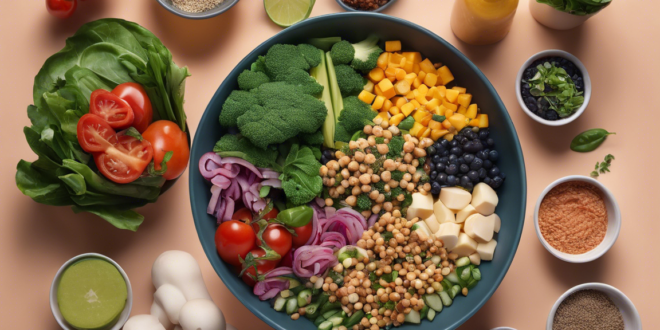Plant-Based Meal Prep Made Easy: Your Ultimate Guide to Effortless, Nutritious Eating
In the fast-paced world of modern nutrition, meal preparation has become more than just a culinary trend—it’s a lifestyle strategy that can transform your health, save time, and support your wellness goals. For those embracing a plant-based diet, meal prepping offers an incredible opportunity to ensure balanced, delicious, and convenient nutrition throughout the week.
Why Meal Prep Matters for Plant-Based Diets
Meal preparation is not just about saving time; it’s a strategic approach to nutrition that can dramatically improve your dietary habits. For individuals following a plant-based diet, meal prep becomes even more critical. By planning and preparing meals in advance, you can:
• Ensure nutritional balance
• Reduce impulse eating
• Save money on grocery shopping
• Minimize food waste
• Maintain consistent energy levels
• Support your health and fitness goals
Essential Tools for Plant-Based Meal Prep Success
Before diving into meal preparation, it’s crucial to equip yourself with the right tools. Here are some must-have items for effective plant-based meal prepping:
1. High-Quality Storage Containers
Invest in a set of durable, leak-proof containers in various sizes. Glass containers are ideal as they’re microwave-safe, don’t retain odors, and are more environmentally friendly than plastic alternatives.
2. Sharp Kitchen Knives
A good chef’s knife and a paring knife will make chopping vegetables and preparing ingredients significantly easier and more efficient.
3. Food Processor or High-Speed Blender
These versatile tools can help you quickly chop vegetables, create sauces, and prepare smoothie ingredients in minutes.
4. Meal Prep Bags or Coolers
If you’re taking meals to work or traveling, insulated bags will keep your prepared meals fresh and at the right temperature.
Nutrition Strategies for Plant-Based Meal Preparation
Creating balanced, nutritious plant-based meals requires thoughtful planning. Focus on incorporating diverse protein sources, complex carbohydrates, healthy fats, and a variety of vegetables and fruits to ensure comprehensive nutrition.
Protein Sources:
• Legumes (beans, lentils, chickpeas)
• Tofu and tempeh
• Seitan
• Quinoa
• Nuts and seeds
Carbohydrate Sources:
• Whole grains
• Sweet potatoes
• Brown rice
• Quinoa
• Oats
Healthy Fats:
• Avocado
• Olive oil
• Nuts
• Seeds
• Coconut
Step-by-Step Meal Prep Guide
Follow these systematic steps to streamline your plant-based meal preparation:
1. Plan Your Menu
Select recipes that can be easily prepared in bulk and store well. Choose dishes with complementary ingredients to minimize waste and maximize efficiency.
2. Create a Grocery List
Based on your menu, develop a comprehensive shopping list. Purchase ingredients in bulk when possible and opt for seasonal produce to save money.
3. Batch Cook Staple Ingredients
Prepare large quantities of:
• Grains
• Roasted vegetables
• Legumes
• Sauces and dressings
4. Portion and Store
Divide prepared meals into individual containers, labeling them with dates and contents.
5. Refrigerate or Freeze
Most plant-based meals can be stored in the refrigerator for 3-5 days or frozen for up to a month.
Sample Meal Prep Recipes
1. Quinoa Buddha Bowl
Ingredients:
• Cooked quinoa
• Roasted sweet potatoes
• Chickpeas
• Kale
• Tahini dressing
Preparation: Roast vegetables, cook quinoa, and prepare chickpeas in advance. Assemble bowls and store separately, combining just before eating.
2. Overnight Chia Pudding
Ingredients:
• Chia seeds
• Plant-based milk
• Maple syrup
• Fresh berries
• Nuts
Preparation: Mix ingredients the night before and store in individual jars for quick, nutritious breakfasts.
Common Meal Prep Challenges and Solutions
1. Preventing Flavor Fatigue
Solution: Rotate recipes weekly and use different spice combinations to keep meals exciting.
2. Maintaining Food Safety
Solution: Use proper storage techniques, invest in good containers, and follow recommended refrigeration guidelines.
3. Time Management
Solution: Start with simple recipes and gradually increase complexity as you become more comfortable with meal prepping.
Advanced Meal Prep Tips
• Use a slow cooker or instant pot for hands-off cooking
• Invest in quality food storage containers
• Learn basic knife skills to speed up preparation
• Experiment with international cuisine for variety
• Track your meal prep progress and adjust strategies
Conclusion: Embracing a Plant-Based Meal Prep Lifestyle
Meal preparation is more than a technique—it’s a commitment to your health, time, and nutritional goals. By implementing these strategies, you’ll transform your relationship with food, making plant-based eating both enjoyable and sustainable.
Remember, consistency is key. Start small, be patient with yourself, and gradually build your meal prep skills. Your body, mind, and schedule will thank you for the investment in your health.
 Good Calories Guide GoodCalories Guide focuses on nutrition, healthy eating, and overall wellness. The site offers practical insights into evidence-based dietary practices, including tips for specific lifestyles such as veganism, keto, and family-friendly meal planning. It also addresses unique nutritional needs for individuals with conditions like diabetes or food allergies, while providing quick and accessible recipes to make healthy living a sustainable and enjoyable choice.
Good Calories Guide GoodCalories Guide focuses on nutrition, healthy eating, and overall wellness. The site offers practical insights into evidence-based dietary practices, including tips for specific lifestyles such as veganism, keto, and family-friendly meal planning. It also addresses unique nutritional needs for individuals with conditions like diabetes or food allergies, while providing quick and accessible recipes to make healthy living a sustainable and enjoyable choice.


